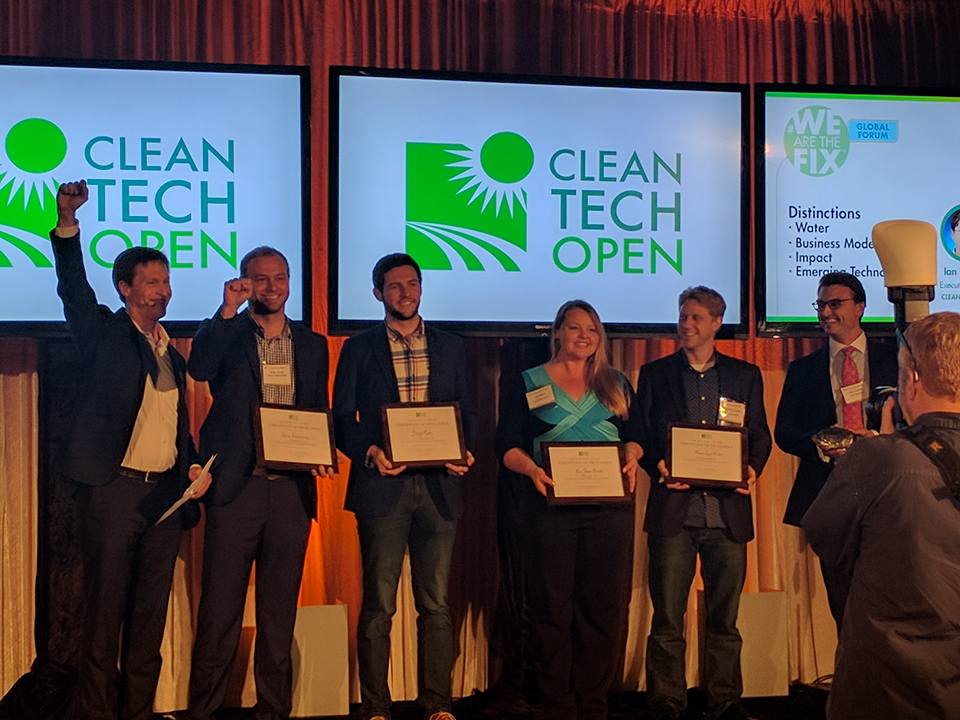30 March 2017, 15:07
Kari Klaus the Founder and CEO of
VivaGreenHomes.com
If you are familiar with the TV show
Shark Tank, you probably have seen entrepreneurs stroll into the room where the shark investors await, and then watched on the edge of your seat as the founder gives her best pitch to the skeptical investors. Be they funny or informative, interactive or bizarre, exciting or awkward, investor pitches are how startup companies get the investment they need in order to grow their business.
But how do startups get to the point where they know how to give that pitch and answer all those detailed questions? The answer is always practice, research, a good business plan, hard work and... often more times than not time spent within an incubator or accelerator program.
The Secret Sauce: A Dash of Expertise
Accelerator and incubator programs exist across the country and work with companies at most any stage of development, from conceptual to early investor funded, and assist many newbie founders get to the next level with their startup companies.
If you are dreaming of starting a company or you’ve already taken the first steps, you should consider an accelerator or incubator program.
These programs have unlimited value to you and your startup, especially if you’ve chosen the right one and have optimized your time and the made the most of it. You can avoid many months or even years of trial and error by learning from people with expertise and surrounding yourself with connections and mentors. The right program could help put you on a path to success by skyrocketing you past many of the lessons already learned by those who came before you. It’s worth it.
To Accelerate or Incubate. What’s the difference?
Accelerator programs tend to be intensely fast-paced, demanding a lot of your time, possibly some of your equity if you win, fees and a lot of commitment. These programs often resemble a start-up competition with requirements for materials, participation, possibly even travel that last from 2-8 months long. Because of these requirements, however, they can succeed in pushing your company to the next stage very quickly.
Incubators on the other hand, are typically self-paced and with no competition winnings, although an occasional pitch competition is not unheard of. They can offer co-working spaces, access to classes, networking and resources to help you advance your startup at your own pace with no requirements and no commitment. Typically they are monthly fee based. However, because they are self-paced, there is less dynamism and therefore, startups needs to be entirely self-driven to success and the pace can be prolonged.
For more information on the differences between accelerators and incubators visit Techrepublic blog
What You’ll Gain
An accelerator program should be able to help you understand and perfect these areas of your startup company:
• Create Business Plans and Executive Summaries
• Investor and elevator pitches and slide decks
• Customer Discovery through Interviews. Product/Market Fit
• Market Strategy
• Competition/ Competitive markets
• Intellectual Property/ Legal
• Finances and Funding, Investors and Other Options
• Product Technology and Needs
• Team Building and Management
Picking the right accelerator
Tips for Startup Success in an Accelerator Program (words from a selectee)
Pick the right accelerator program for you. I know this sounds obvious, but it's not. Rules for some accelerator programs may exclude you if you’ve completed an accelerator previously. So, going through the right one successfully is really important because you may not get another chance.
Here are some questions you should ask:
1. Will you need to move if you win the competition?
2. What types of companies are they looking for?
3. Do you need to give up equity? If so, how much? And what are the terms?
4. Who are the mentors and how much time will they dedicate to you and what is their expertise?
5. What other connections can and will the accelerator’s organizers try to provide to you and at what stage, i.e. investors, sponsors, and possible partners?
List of 2016 Top Accelerators
The Best Startup Accelerators Of 2016
See the ranking below (listed within tiers by alphabetical order)... Full article Brian Solomon, FORBES staff.
Platinum tier: 500 Startups, Alchemist, Amplify LA, Angelpad, Chicago New Venture Challenge, MuckerLab, StartX, Techstars, Y Combinator
Gold tier: Brandery, Capital Innovators, Dreamit, gener8tor, Healthbox, Mass Challenge, Surge
Silver tier: Alphalab, Betaspring, Health Wildcatters, Iron Yard, Lighthouse Labs, Plug and Play, Zero to 510
Make sure your startup has a successful chance of winning. Ask the program if other companies in your industry have won in prior years to gauge the rate of possibility of success.
For example: If your startup’s internet technology like a website, but most companies that have won were product based, this might not be the best option for you.
 Make sure you can afford it -- all of it.
Make sure you can afford it -- all of it. The processing fees are just one part of it. But if it requires travel that means transportation and hotel expenses too, which can rack up very quickly on an entrepreneur’s tight budget. If you are spending money on the competition that you don't have, you’ll likely find yourself making tough decisions 3 or 6 months into it about whether to complete the competition or to pay your rent or your team members. Ask how much travel or other expenses might be needed to complete the competition in its entirety.
What are the winnings, really? And if there are winnings at each stage. Sometimes it’s cash, sometimes it’s a mixture of cash and services. Know and understand the terms of the winnings. It’s better to know what the winnings are and if you will actually use or want to accept them all.
Contact recent startup accelerator participants, do a Google search and get recommendations. We rarely do anything without an online review or asking a friend before spending time and money; seeing a movie, going to a restaurant, hiring a professional-- you should do the same for your accelerator. Do a little research first and ask participants about their experience with the accelerator.
Now that you’ve picked the right accelerator. Here are some tips to help you win.
Build your team, your advisers and mentors. You're going to need them. This is not a solo operation, really nothing in a tech startup is. The more people you can get to help you through the program, the better. You will need your team to be your audience, help you conduct research and hone your pitch, prepare your slide deck and the investor documents. And ultimately the more people that participate and offer advice, the wider range of input is added to the business model and the pitch and the more successful you will be in front of a panel of judges with varied backgrounds that may ask you any number of surprising questions.

Who will cave and who will keep calm and think quickly on their feet to succeed? Changes to the amount of time you're allowed to do your pitch, audio and lighting issues, technical and presentation issues, wrong presentation times and even wrong judges and everything in between. I have been part of and have heard of all these issues happening to people in competitions. Being organized and prepared for the unknown is key.
Some key items to remember:
• Be prepared to change the time of pitch
• Cut out or condense areas of your pitch
• Always carry a USB drive with you of your investor slide deck in case of technical issues during competition time.
Hunger Games + Shark Tank = the real life of an accelerator.
Know that this will be time consuming. Practicing, preparing presentations, traveling, and the actual time competing will take up a lot of time. But just remember that the tasks that you are being asked to do to in the accelerator program are things that you'd need to do anyway to be a successful company. The difference is, however, is that things are literally accelerated and you’ll be fortunately guided by experts so it’s worth it, but you’ll need to be focused and dedicated.
Make sure that for the duration of the program you don’t have any other major time commitments or travel that will prevent you from participating fully in the program. Otherwise, hold-off until you can commit fully.
Be a good competitor, but be an outstanding professional. As the old saying goes, business is about relationships. People will always remember how you conducted yourself. Be professional to fellow competitors and others because you never know - today they might be a competitor, but tomorrow they may be your business partner or an investor.
Finally, people often make the mistake of not practicing their pitch enough. A good idea not expressed well, is an opportunity missed. Practice your pitch. Yeah, yeah. You think you
practiced because you read it a few times. No.
You haven't truly practiced your pitch until you've:
• Said it out loud every time you showered for the full week before your competition.
• Read it loudly 20+ times in front of your computer, with or without a Skype friend or mentor.
• In front of an audience of friends, or even better strangers, to hear you on a real stage. You can ask to use stages at your local theater, convention space or community centers or schools.
• Every time you are in an elevator, practice your elevator pitch… of course. You can do this alone, but of course if depending on the audience you may want to practice with others too. You never know if an investor might be listening!

But above all, make sure to have fun. Find time to enjoy the experience and meet new people, whether they will be good for your company or not. Burn out is real and the stress is intense.
So, one of my favorite tips is to practice my pitch at a bar with friends, and it’s especially good when I’m celebrating the finale of a successful accelerator program and right before landing a meeting with investors.
Good luck!

Kari Klaus, Founder and CEO, is
2016 Cleantech Open’s National Finalist & Business Award Recipient for the Business Model with the Best Chance of Immediate Investment and Commercialization and winner in Cleantech Open Southeast regional for her startup company
www.VivaGreenHomes.com, an innovative and data-driven real estate website offering consumers enhanced home listings information such as energy efficiency, solar cost savings, certifications and more.
More Resources To Find Your Accelerator:
Back to news





